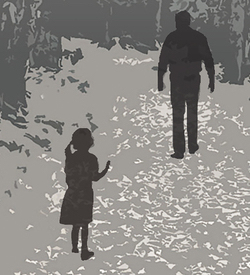The father is decisive in the destiny of the individual
(Jung, 1961, para. 303)
For all children, the relation with the father is of great importance. For some replacement children, the father has been an important support, while for others a father who expected his daughter to be a replacement for a lost child, has added to her dilemma of not being seen by not having felt loved and supported.

Absent Father by Susan E. Schwartz examines the deep wounds when a father has been missing. A daughter (or son) can even be given or take on the role to be a replacement child for an absent father, resulting in the parentification of the child and leaving the child bereft of a father experience, with consequences for relationships later in life. Thank you to Susan E. Schwartz for the below contribution to Replacement Child Forum.
Her book can be found at Amazon.
The Absent Father by Susan E. Schwartz
It is this irruption of the self which has most often been described:
I am myself because somebody sees me.–Jean Paul Sartre, 1943
A woman dreamt she was to take care of her father. The meaning in this one line depends on the dreamer, her interpretation and can connote many things about the relationship to her father. Why is she to take care of him?
A daughter can also be a replacement child for a father, even if he is there, that is: if a father is emotionally and or physically absent, a daughter can be replacing his feminine function, his relational capacity, and be both truncated in her own individuality and feeling used while sorely missing the father. Why is the dream succinct and without embellishment? The dream raises further questions about which father – the internalized father, the personal father, the father complex or archetype?
What does the dreamer desire? Desire is shaped by his image, the image of father as both an outer and inner object in her development. But, what if a father doesn’t provide one? When absent, the father becomes associated with yearning, sadness, frustrated love, anger, oppression and longing. The father without consciousness and his feelings deadened sets up conflict. Can the daughter live for herself or does she fill his grief, depression and loss? The contradictory feelings bring stress to body and soul. The absence brings her need to unravel the unconscious demands from living his idea of the feminine and what she is to replace for him personally, relationally, and culturally.
Reactions vary. For some, the emotional, physical, or psychically missing or what has been called the ‘dead father’ becomes idealised. A father is not available, when the love pact is ruptured and when he cannot bond or when he imagines in the living daughter those previously wished for and now lost but un-mourned. His emotional preoccupation contributes to her self-image as inadequate, immature but dutiful, and repressing her negative feelings as she tries to please him. Even if turning her back on him she can become buried symbolically in his skin and act against herself. The extent of the daughter’s idealisation of father, the masculine and the patriarchy portray how much she felt he was not present to her and instead she was to live for him.
For a well embodied sense of her psychological self, a daughter needs the developmental and relational patterning shaped by experiencing father as a love object, with relatedness and support for her individuality. His absence, physical or emotional, is a problem that is, or should be, preoccupying in our times, as it is sadly not an uncommon experience. Marked by unrequited love, the absent father is like a breeze through a vacant home, a shadow. She embodies his chronic losses, anxiety and depression as her scenarios, day after day, year after year, dream after dream.
Through Jungian analytical work, a daughter who has experienced her father as absent, can recover meaning from the effects of his absence, and discover in her personality images of an archetypal presence filling in for this gap.
Becoming aware of the role she may have been playing, of being a replacement child, is a central part of gaining consciousness leading eventually to her separation and self-expression.
This blog is excerpted from the book The Absent Father Effect on Daughters, Father Desire, Father Wounds by Susan E. Schwartz, Ph.D. Jungian analyst published by Routledge November, 2020.